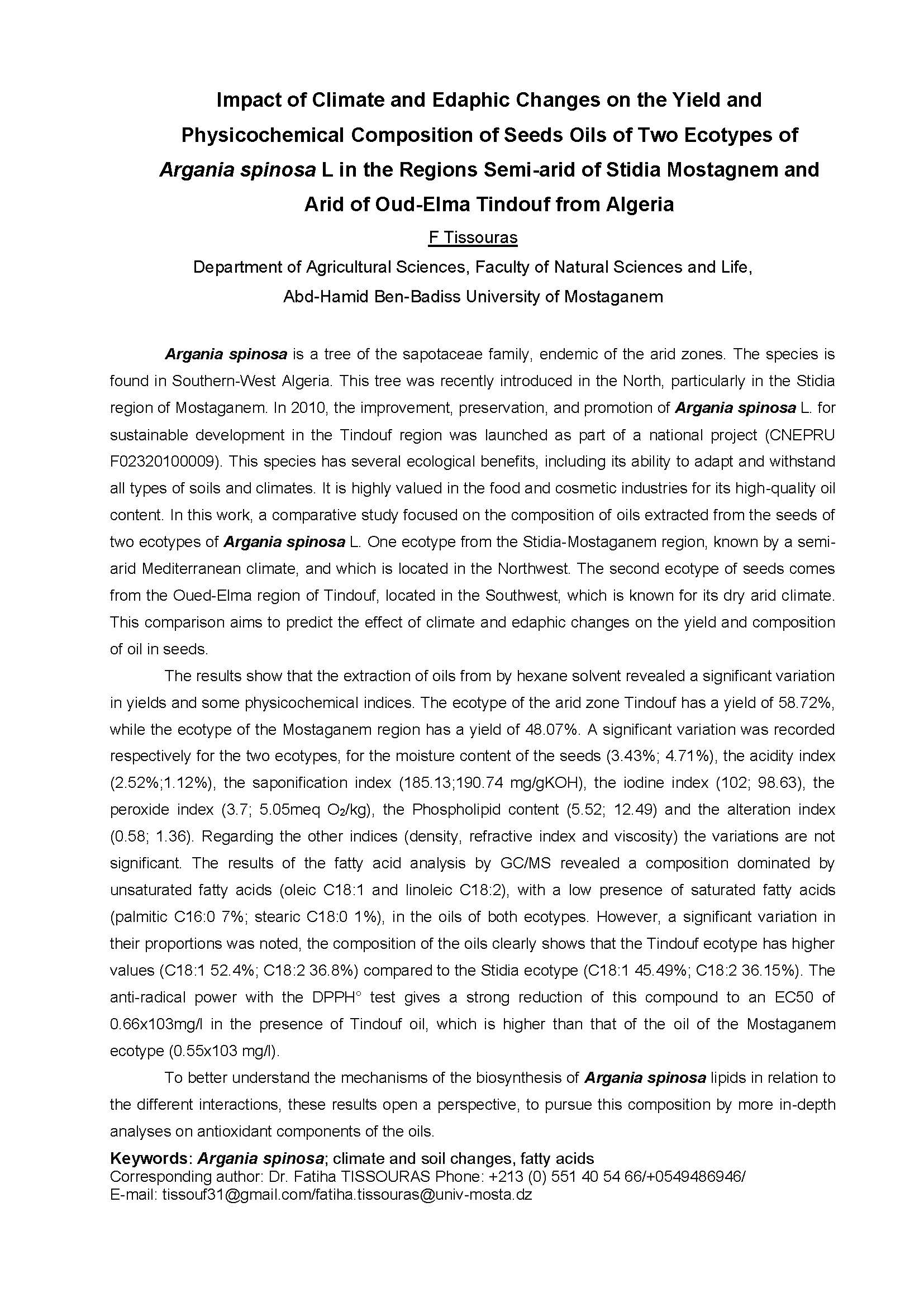Argania spinosa is a tree of the sapotaceae family, endemic of the arid zones. The species is found in Southern-West Algeria. This tree was recently introduced in the North, particularly in the Stidia region of Mostaganem. In 2010, the improvement, preservation, and promotion of Argania spinosa L. for sustainable development in the Tindouf region was launched as part of a national project (CNEPRU F02320100009). This species has several ecological benefits, including its ability to adapt and withstand all types of soils and climates. It is highly valued in the food and cosmetic industries for its high-quality oil content. In this work, a comparative study focused on the composition of oils extracted from the seeds of two ecotypes of Argania spinosa L. One ecotype from the Stidia-Mostaganem region, known by a semiarid Mediterranean climate, and which is located in the Northwest. The second ecotype of seeds comes from the Oued-Elma region of Tindouf, located in the Southwest, which is known for its dry arid climate. This comparison aims to predict the effect of climate and edaphic changes on the yield and composition of oil in seeds.
The results show that the extraction of oils from by hexane solvent revealed a significant variation in yields and some physicochemical indices. The ecotype of the arid zone Tindouf has a yield of 58.72%, while the ecotype of the Mostaganem region has a yield of 48.07%. A significant variation was recorded respectively for the two ecotypes, for the moisture content of the seeds (3.43%; 4.71%), the acidity index (2.52%;1.12%), the saponification index (185.13;190.74 mg/gKOH), the iodine index (102; 98.63), the peroxide index (3.7; 5.05meq O2/kg), the Phospholipid content (5.52; 12.49) and the alteration index (0.58; 1.36). Regarding the other indices (density, refractive index and viscosity) the variations are not significant. The results of the fatty acid analysis by GC/MS revealed a composition dominated by unsaturated fatty acids (oleic C18:1 and linoleic C18:2), with a low presence of saturated fatty acids (palmitic C16:0 7%; stearic C18:0 1%), in the oils of both ecotypes. However, a significant variation in their proportions was noted, the composition of the oils clearly shows that the Tindouf ecotype has higher values (C18:1 52.4%; C18:2 36.8%) compared to the Stidia ecotype (C18:1 45.49%; C18:2 36.15%). The anti-radical power with the DPPH° test gives a strong reduction of this compound to an EC50 of 0.66x103mg/l in the presence of Tindouf oil, which is higher than that of the oil of the Mostaganem ecotype (0.55×103 mg/l).
To better understand the mechanisms of the biosynthesis of Argania spinosa lipids in relation to the different interactions, these results open a perspective, to pursue this composition by more in-depth analyses on antioxidant components of the oils.
Keywords: Argania spinosa; climate and soil changes, fatty acids
Corresponding author: Dr. Fatiha TISSOURAS Phone: +213 (0) 551 40 54 66/+0549486946/
E-mail: tissouf31@gmail.com/fatiha.tissouras@univ-mosta.dz
